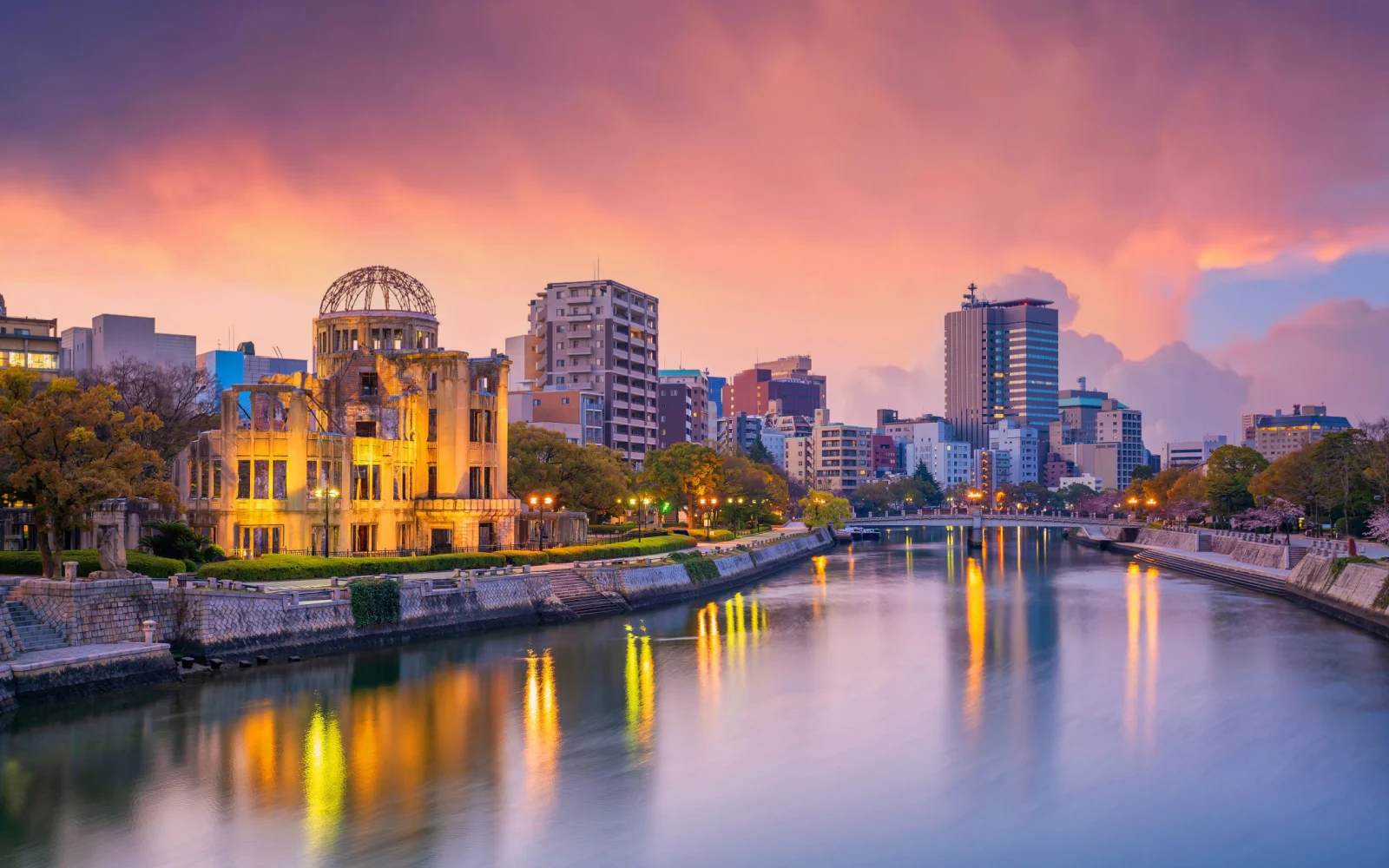For most people, the name Hiroshima is associated with the atomic bomb. Today, the city is a powerful monument to the capacity of humanity’s destruction… and for resilience.
Visitors have to be solemn when they take in the Atomic Bomb Dome and its surrounding park. These monuments reflect the city’s hope that what happened here won’t happen ever again. But if you go beyond the bomb, Hiroshima has a lot to offer.
The seaside city is famous for its cuisine and its natural beauty. Hiroshima is a picturesque base for exploring the surrounding nature, including forests, hot springs, and small towns and shrines.
Visiting this city is about so much more than disaster tourism; you have stunning nature, fantastic cuisine, and rich culture to discover once you venture there. But is Hiroshima safe to visit? Here’s our take.
Is Hiroshima Safe to Visit in 2026?
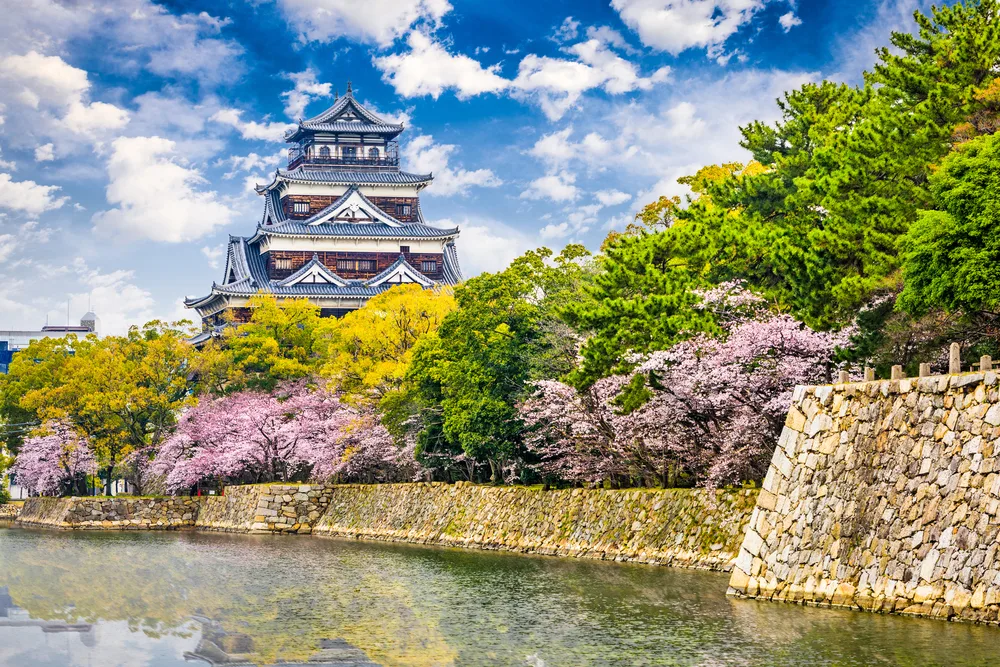
Sean Pavone/Shutterstock
Yes. Despite concerns about radiation from the atomic bomb of 1945, Hiroshima is very safe to visit today. You face the same challenges as elsewhere in Japan, such as pickpocketing, harassment, and bad weather.
But the crime rate in the city, like in the rest of Japan, is very low.
Although many tourists are concerned about radiation, radiation levels currently are negligible, and you won’t have to worry about your health and safety in Hiroshima.
The primary reason tourists worry about visiting Hiroshima is that they associate the city with the atomic bomb. Hiroshima is one of the only cities on the planet to be hit with an atomic bomb, along with Nagasaki.
According to the Bulletin of Atomic Scientists, the estimates of how many people died in Hiroshima from either the direct blast in 1945 or the aftereffects of radiation range from 70,000 to 140,000.
The atomic bomb is a weapon with unparalleled levels of destruction, so it’s no wonder that potential tourists to Hiroshima are worried about residual radiation. After all, we all learned in school that nuclear particles take years, if not centuries, to decay.
However, the particles used in the atomic bomb were different. As the city of Hiroshima’s website explains, the type of residual radiation from the bomb has a very quick half-life.
Most of it was emitted in the 24 hours after the blast and then dissipated. Today, the radiation levels in Hiroshima are the same as anywhere else on Earth. It’s comforting to know that you won’t need to worry about nuclear waste, but what about other potential dangers, such as crime or natural disasters?
Hiroshima is like the rest of Japan in that the crime rate is fairly low. Other dangers for tourists are very rare. The United States State Department has a “Level 1: Exercise Normal Precautions” advisory in place for all of Japan, including Hiroshima.
Petty crimes such as pickpocketing do happen, although the rate is much lower in Hiroshima than in Tokyo or other larger cities that are popular tourist attractions.
Another Japan-wide problem that affects Hiroshima as well is sexual harassment. Both of these crimes are uncomfortable, but not violent or dangerous to your life. The nature surrounding Hiroshima is a different story.
Japan is prone to natural disasters such as earthquakes, typhoons, and tsunamis. Hiroshima is prone to many of those disasters as well, especially during typhoon season when heavy rains can cause flooding and landslides.
The city authorities advise tourists to research seasonal weather patterns, carefully monitor weather alerts while in the town, and research emergency procedures just in case.
To recap, the primary concerns most tourists have before visiting Hiroshima are:
- Radiation poisoning
- Natural disasters
- Pickpocketing
- Sexual harassment
Of these, the most likely is your risk of getting caught in a natural disaster if you time your visit poorly, but some research ahead of time can help prevent that. In general, Hiroshima is very safe for tourists.
Crime in Hiroshima
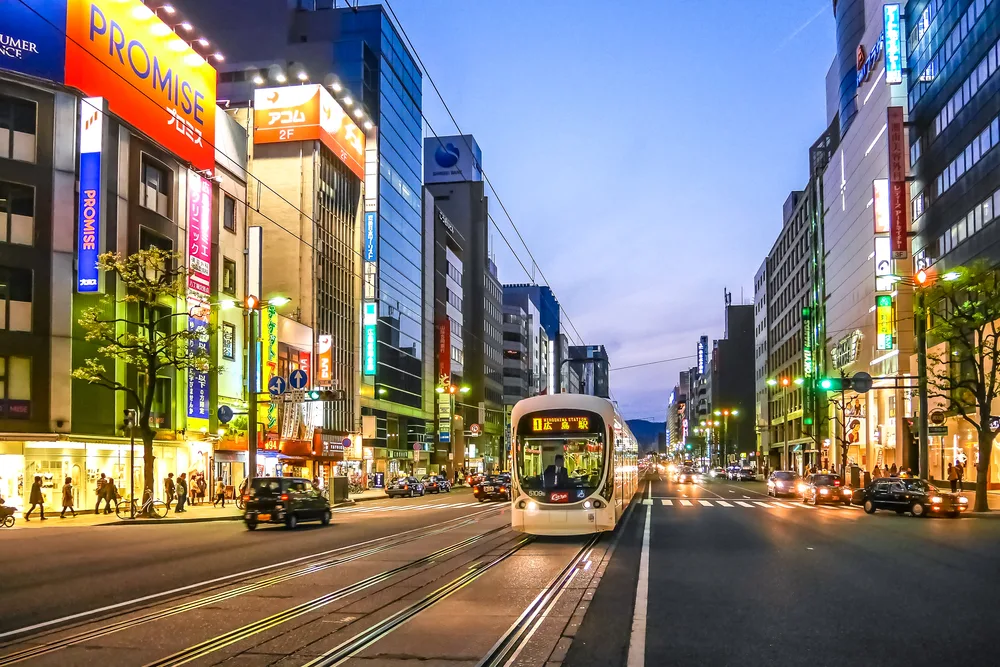
Hiroshima Electric Railway, Japan – Mar 29, 2015. The street car is going to Hiroshima Station/Robert CHG/Shutterstock
Most travelers are concerned about crime when they travel to a new place. They don’t want to come home without their fancy camera they bought to make memories of their trip or traumatized or worse by some violent crime.
Japan is a great destination for travelers worried about crime and those who are maybe going abroad for the first time because of its incredibly safe cities.
The Canadian government tells citizens that crime against foreigners in Japan is very low, although incidents do happen, and gives them the green light for visiting the country. What is true of the country as a whole is true of Hiroshima as well.
According to Knoema, the crime rate per 100,000 people in Hiroshima prefecture is a measly 88.2 incidents. Hiroshima prefecture is actually one of the safest in Japan.
It is 25th out of 47 prefectures in terms of crime rates. Hiroshima’s crime rate is actually lower than in many more popular tourist destinations in Japan, including Kyoto, Tokyo, and Osaka. Most crimes that occur in Hiroshima are minor, such as pickpocketing or bag snatching.
Violent crime in Hiroshima, as in all of Japan, is very rare. Violent crimes, such as the 2005 murder of Airi Kinoshita, are so rare that they stun the city for years to come.
Most visitors to Hiroshima will find that the city is safer than their hometowns. You can protect yourself from most crimes you might encounter in Hiroshima with some basic precautions.
Pickpocketing and Petty Theft
The most common crime tourists encounter in all of Japan is pickpocketing and petty theft. Hiroshima is no different. Petty theft rates for Hiroshima are pretty low, but crimes can still happen.
Pickpockets and bag snatchers are criminals of opportunity. They don’t want to directly confront their victims but take advantage of distracted tourists to relieve them of their valuables.
In Hiroshima these crimes are very rare, but it’s still good to be aware. Make sure that your valuables are safely stored in a bag with a zipper and that you never leave your bag or wallet unattended.
A crime you might encounter in Hiroshima and elsewhere in Japan is credit card fraud or ATM fraud. Be careful about using your card in sketchy establishments so they don’t overcharge you or try to steal your information.
When withdrawing money from the ATM, try to use ATMs in banks if possible and check for card skimmers or spy cameras trying to get your PIN. When it comes to petty theft, you have the most to worry about when you try to explore Hiroshima’s nightlife.
Although not nearly as bustling (or as dangerous) as Tokyo’s clubs, Hiroshima has its fair share of nightlife. Everywhere in Japan (in the world, really) people in nightclubs try to take advantage of inebriated tourists.
Make sure you only take sufficient cash and one card, kept securely, with you when clubbing. Never leave your drink unattended and check reviews of bars to minimize your risks of getting your drink spiked.
Sexual Harassment
Despite its safe reputation, sexual harassment is unfortunately a widespread problem in Japan. According to a government survey, one third of Japanese women suffer sexual harassment in the workplace.
Including women who suffer sexual harassment on the streets, on public transportation, and elsewhere, the number is much higher.
One problem that Japanese feminists have pointed out for decades is that the Japanese authorities are not very helpful, and often combative towards female victims that come forward looking for help.
A recent high-profile case in Hiroshima, where a woman was denied damages from the father who sexually abused her for her entire childhood, drove home the fact that Japan still has a lot of work to do.
The Canadian government emphasizes that women might be in danger in its travel advice for Japan.
It cautions female travelers, especially those traveling alone, to beware of catcalling, verbal harassment on the streets, and inappropriate touching on the streets and on public transportation.
If you are a woman traveling to Hiroshima, especially alone, you might experience sexual harassment, although the rates here are lower than in bigger cities such as Tokyo. Try to travel in woman-only train cars on public transportation when possible and avoid dark streets at night.
Avoiding Bad Areas
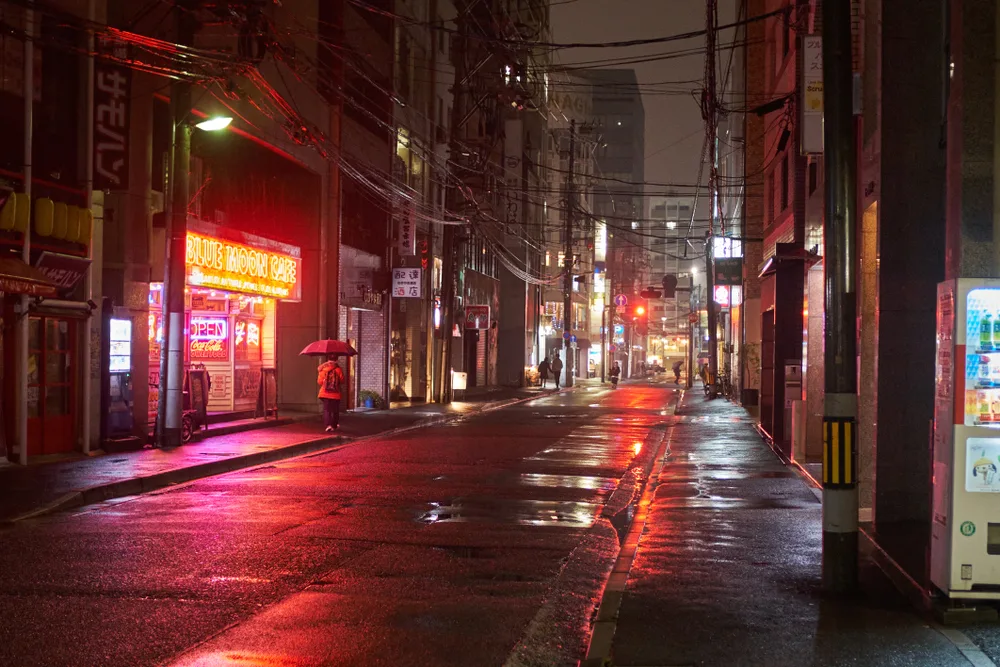
BradleyStearn/Shutterstock
Hiroshima in general is very safe. It is a quiet city with a lively cultural scene. There aren’t any particular neighborhoods that are unsafe, although you should take general precautions when walking around, the same as you would anywhere.
Hiroshima’s main nightlife district is around Nagarekawa Street. The nightlife district is vibrant, with plenty of clubs, bars, and people at all hours of the day and night.
However, you should take the same precautions you would at any other nightlife district. Beware of aggressive club promoters, pickpockets looking to take advantage of inebriated tourists, and assaulters trying to spike drinks.
Women walking here may also face more street harassment due to high concentrations of inebriated men. Elsewhere in Hiroshima, just make sure you use basic common sense. Stick to well-lit areas if walking alone at night.
If you are nervous, trust your instincts and hail a taxi to get back to your accommodation. There isn’t that much English-language information available about the safety of different Hiroshima neighborhoods, so when in doubt, ask your hotel receptionist for advice.
Things to Consider
Here are some other things to keep in mind when traveling to Hiroshima:
- Although the atomic bomb didn’t leave behind any physical radiation lasting to the present day, its impact on people resonates decades later. Avoid being insensitive about the topic and don’t bring it up with people, especially not in a triumphant way.
- Typhoon season is from June to November. Since Hiroshima is on the coast, it gets hit harder than most other places by typhoons. You can still come during typhoon season, but make sure that you carefully monitor weather reports.
- As of early 2023, Japan still has COVID-19 precautions in place, and you may be required to show proof of vaccination or a negative test result. Thoroughly research the requirements before you book your trip to avoid a disappointing surprise at the airport.
- Japan’s nightlife is world-famous but know your limits when you go out. Some unscrupulous bartenders will spike drinks with extra alcohol to take advantage of customers, so if a place feels sketchy, get out of there. If your drink feels too strong, you don’t have to finish it.
Frequently Asked Questions
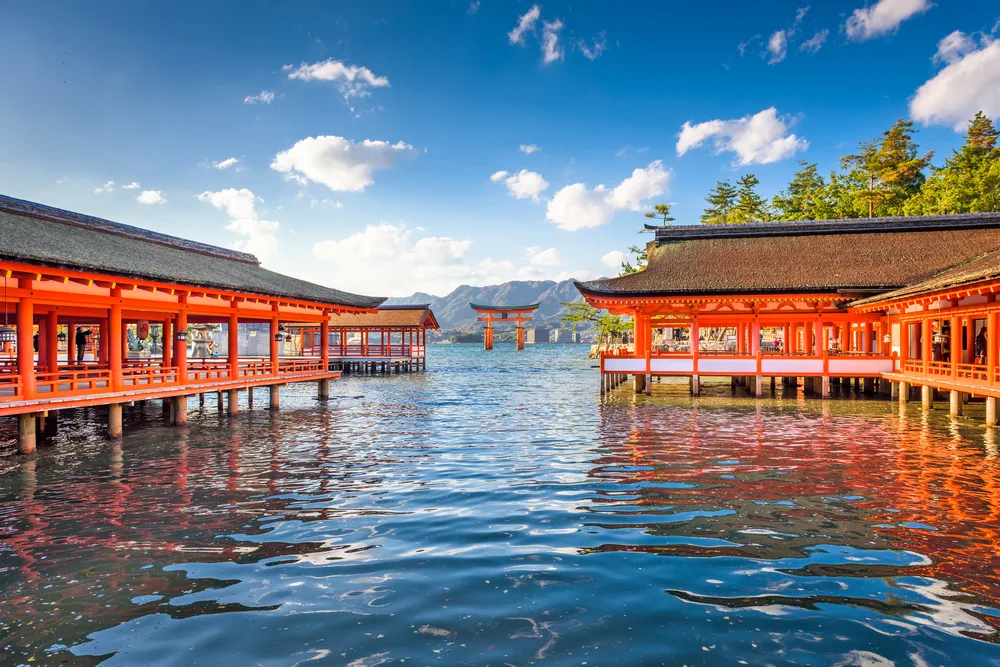
Sean Pavone/Shutterstock
Want to know more about your trip to Hiroshima? Here are some other things to keep in mind:
How long until Hiroshima is habitable again?
Hiroshima was actually habitable just a few weeks after the atomic bomb in terms of radiation poisoning (how long it took to rebuild the infrastructure is a different matter). That’s because the isotope used in the atomic bomb has a shorter half-life than other forms of radiation and decays faster.
Are there still birth defects in Hiroshima?
No, there aren’t still birth defects in Hiroshima. Even studies conducted a few years after the bomb didn’t find a statistically significant higher population of babies with birth defects compared to the general population.
Why is Hiroshima habitable?
Hiroshima is habitable because the amount of radiation released by the bomb is less than the radiation released by a failed nuclear power plant, such as Chernobyl, and has a shorter half-life. It was immediately more devastating but had less long-term effects than a disaster such as Chernobyl.
Is Hiroshima still radioactive?
According to studies conducted by the city of Hiroshima itself, it has not been radioactive for a long time. It has the same low levels of background radiation that you would find elsewhere on Earth.
How does Hiroshima look today?
Hiroshima today looks like a bustling, modern city. It has over 1 million inhabitants, an important industrial center with international companies such as Mazda, and even a nuclear power plant for electricity. Most of the historic core is gone, however.
So, Is Hiroshima Safe to Visit in 2026?
As we’ve stated above, Hiroshima is safe to visit. So, with so much to see and do and a very safe environment, what are you waiting for — book your trip today!



